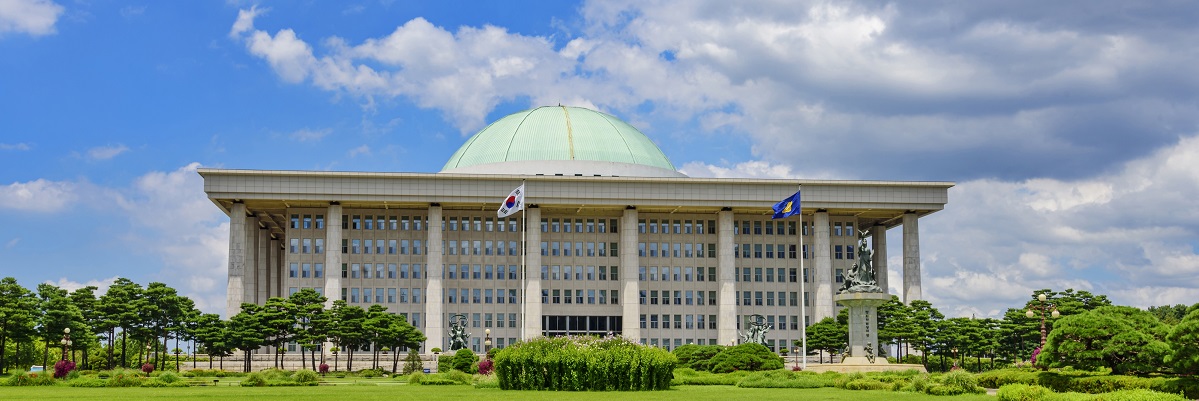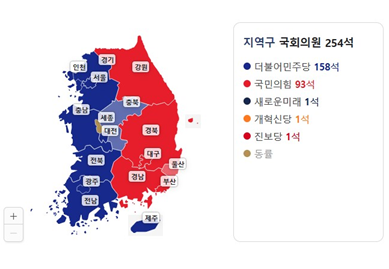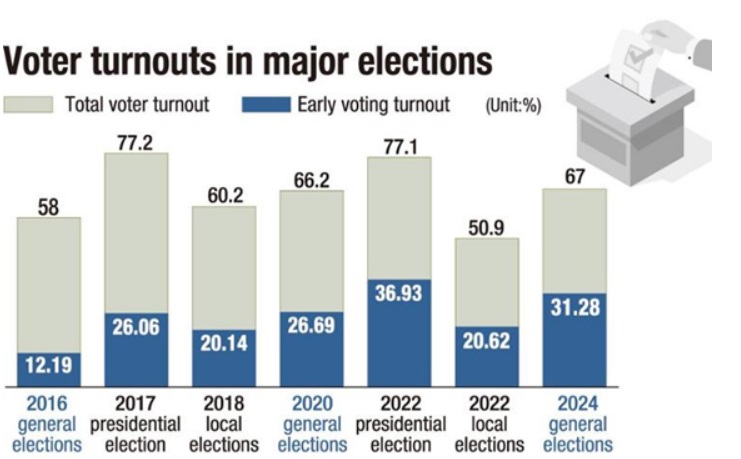Diplomacy
Parliamentary elections in the Republic of Korea and their possible impacts

Image Source : Shutterstock
Subscribe to our weekly newsletters for free
If you want to subscribe to World & New World Newsletter, please enter
your e-mail
Diplomacy

Image Source : Shutterstock
First Published in: Apr.14,2024
May.17, 2024
The recent parliamentary elections held in the Republic of Korea on April 10th, 2024, with the purpose of forming the XXII Legislature of the National Assembly, have had a significant political significance almost halfway through the current president’s term, Yoon Suk-yeol of the conservative People Power Party (PPP). Since the beginning of his presidency in 2022, most of the Parliament was dominated by the liberal Democratic Party (DPK), which had won the previous elections of this type in 2020 amid the impact of Covid-19. To understand the political system of the Republic of Korea, it is necessary to know that, during the period of authoritarian government in the 20th century, politics were controlled by a single dominant party, although others formally existed. Since the democratization stage, there has been a marked bipartisanship that has dominated the political landscape. This process has been characterized by the alternation between government and opposition. Initially, the evolution of these two parties has not been under the same name, as they have changed frequently, so they are commonly known as conservatives (identified by the red color) and progressives (identified with the blue color). The change of political branding has accompanied the process of merging political organizations, both before and after elections. These organizations continue to be largely led and centered around the figures of the leaders, showing a high level of factionalism and personalism. Although formally the Republic of Korea presents a multi-party system, it has been de facto a two-party system, characterized by a low level of institutionalization. Its key characteristics are deeply rooted in regionalism and ideology, with generation, class and gender associated with these. Meaning that, traditionally the western part of the country has had a more progressive tendency, while the eastern part has been more conservative, and in 2024 this was no exception (figure 1). The DPK is currently identified as the first and the PPP as the second, respectively; it should be added that in terms of gender, women generally identify more with the DPK, while young men with the PPP.
Figure 1: Partisan delimitation by color after vote counting for the 22nd National Assembly elections.

Source: Naver (2024)
Year 2022 marked the first time that 18-year-olds were eligible to vote in presidential elections and participate in local elections. Both the former People’s Party, and the PPP saw these young voters as a key demographic group. As the PPP consolidated support among young male votes with the rise of Lee Jun-seok and his claim of reverse discrimination, the DPK intensified its efforts to attract young female voters (Kim, 2022). While the country’s politics are dominated by two main parties, which have changed names at certain times, there is also a group of parties with lesser proportional representation or even none in the National Assembly. The major political forces currently are the DPK and the PPP, although others include the Green-Justice Party (center-left position, supporting dialogue with the Democratic People's Republic of Korea), New Future (centrist reformist), New Reform Party (conservative), Rebuilding Korea Party (centrism, liberalism, and reformism), Liberal Unification Party (far-right), among others. In total, there are more than 15 minor right-wing parties, around seven that are centrist, and about five that are progressive. There are also others that are focused on a single issue, such as the Women’s Party, and some that have attempted to register without success, like the Nuclear Nation Party, with a fascist conception. [1] For the 2024 parliamentary elections, the Electoral Advisory Committee, composed of 33 experts from various fields including media, academia, legal circles, public relations, and civic groups, was tasked with ensuring fair election management and advancing the electoral system. In a meeting in February 2024, the council promoted new measures to enhance public confidence in electoral management. It was decided to respond to illegal acts such as videos created by artificial intelligence, as had previously occurred against the country’s president, and to improve the objectivity and reliability of electoral opinion polls. Measures were taken, including the addition of verification procedures in the vote counting process; changing the notation format, such as from serial numbers on postal ballots to 1-dimensional barcodes; and managing surveys and vote counting, with constant dissemination of videos from cameras in storage locations, such as advance ballot boxes, to determine the transparency and reliability of the electoral management through the establishment of a plan to improve procedures (National Election Commission of the Republic of Korea, 2024).
While the National Assembly was controlled by the DPK in May 2022 when conservative President Yoon came to power, the PPP’s efforts were focused on gaining control of the legislature in the recent April 2024 elections. Unfortunately for the latter, the results have once again been dominant for the DPK. The general elections on April 10 saw the highest turnout of the country in 32 years, following a historic peak in early voting, as announced by the National Electoral Commission (NEC). The total turnout reached 67%, representing an increase of 0.8% compared to the general elections of 2020, which recorded a turnout of 66.2% (see figure 2). Out of 44.88 million eligible voters, approximately 29.66 million people cast their votes in 14,259 polling stations to elect 300 lawmakers for the 22nd National Assembly. (…) Voters cast two votes, one for the 254 single-member constituencies and another for the remaining 46 proportional representation seats. A total of 21 parties contested the elections based on districts, while 38 political parties competed for proportional representation (Jung, 2024).
Figure 2: Voting trends in the different elections from 2016 to 2024 in the Republic of Korea.

Source: National Election Commission
The main opposition party, the DPK, is poised to achieve a decisive victory in the general elections, with the broader liberal opposition bloc expected to secure up to 200 seats in the 300-member National Assembly. This projection deals a significant blow to President Yoon Suk-yeol. Exit polls conducted by the nation’s top three broadcasters KBS, MBC, and SBS indicated that the DPK was projected to secure between 178 to 197 seats when combining electoral victories with proportional representation seats obtained by its satellite party, the United Democratic Party. This outcome will solidify the DPK’s participation in the current Assembly controlled by the opposition for the next four years. Meanwhile, the ruling PPP was projected to secure between 85 to 105 seats, including those obtained through proportional representation from its satellite party, the People's Party (Lee, 2024). The results were fairly accurate, with almost all votes counted, as the DPK won 161 out of 254 directly contested seats, while the PPP only secured 90 seats (Lee C., 2024). The Rebuilding Korea Party (RKP), a progressive-leaning party led by former Justice Minister Cho Kuk, was on track to secure between 12 to 14 seats, marking a notable debut in its first elections since its launch in March. The party chose not to field candidates in the constituencies but focused solely on proportional representation seats. Among other minor parties, the New Reform Party, led by former PPP leader Lee Jun-seok, was projected to secure one to four seats. The New Future Party, headed by former DPK leader Lee Nak-yon, was expected to secure up to two seats (Lee, 2024). The emergence of the RKP is related to internal divisions within the DPK following the conclusion of President Moon Jae-in’s presidency (DPK), which intensified after the 2022 presidential elections when supporters and opponents of Moon divided. Its leader, former Justice Minister Cho Kuk and a supporter of Moon, who emerged as a political phenomenon, is expected to represent a new threat to the administration of Yoon Suk-yeol, as the party made it clear during the electoral campaign that its goal is to punish the “autocratic” administration that, it claims, is controlled by former prosecutors, including Yoon (Nam, 2024). If the final election results, which will be confirmed in the early hours of July 11th (night of July 10th Cuba time), fall within the range of the exit polls, the RKP will be the third largest political party in South Korea, after the main opposition DPK and the ruling PPP. Cho, who served as the Senior Presidential Secretary for Civil Affairs and Minister of Justice during the previous administration of Moon Jae-in, is widely described as one of Yoon’s main antagonists for the presidency. He has been under scrutiny for years over allegations that he and his wife fabricated academic documents to get their daughter admitted to medical school. Yoon, who was the prosecutor general at the time (2020), insisted on investigating Cho, leveraging those actions to rise in politics among conservatives and eventually be elected president. (…) Cho lost his job as a professor at Seoul National University, his wife went to prison, and their daughter lost her medical license. Under the Yoon administration, the Cho family has literally lost everything, and this background has transformed him into a political champion who has lost everything and is standing against the administration (Nam, 2024). As of 2 am on April 11th in South Korea (1 pm on April 10th, Cuba time), the count stood at 92.95%, with the DPK (더불어민주당) accumulating 158 elected seats out of the 254 seats for single-member constituencies; the PPP (국민의힘), 93, while the New Future Party (새로운미래), New Reform Party (개혁신당), and the Progressive Party (진보당) has each obtained one seat up to that point (see figure 1). Lee Jun-seok, candidate of the New Reform Party, was elected as a member of the National Assembly after 13 years of entering politics. He was the leader of the PPP (the youngest in the party’s modern political history) at the time of the 2022 presidential elections and contributed to President Yoon’s landslide victory. In late 2023, he split from the party and formed a new one after a long-standing feud with the majority faction of the PPP, composed of loyalists to President Yoon Suk-yeol. Lee is considered by the DPK as a leader who could lead the development of far-right populism and is followed by young men who are negative towards feminism. Political figures like former Foreign Minister Park Jin, who resigned from his position to run in the elections, lost with 46.3% against his DPK rival who obtained 53.8%, causing further negative impacts on President Yoon's presidency (박기호, 2024). Even though he loses the majority, it is important for President Yoon to have key figures from his party in the National Assembly. Currently, he is facing internal political challenges regarding the rejection of increases in medical school admissions, questions about his wife's corruption issues, among other elements. The president's popularity level ranges between 34-40% in recent times, so such a setback will affect him for the remainder of his term. These election results could lead Han Dong-hoon, interim leader of the ruling PPP, former prosecutor, and close to the president, to diminish his prominence and wait for the local elections in 2026. The results of the DPK, combined with the satellite parties that support it in the National Assembly, could lead to a series of future conflicts with the executive, making it difficult for Yoon and the PPP to govern freely. The DPK has several contradictions with the PPP from domestic policy to foreign policy. Particularly on foreign policy issues, they are more inclined to improve relations with the Democratic People's Republic of Korea (DPRK), strengthen ties with China, and not overly reinforce links with the United States. On issues with Japan, they oppose the current policy of rapprochement and maintain firm stances on unresolved historical issues. Regarding China, there have been some recent signs of change with the idea of holding a trilateral summit between South Korea, China, and Japan at the end of May.
The results of the parliamentary elections in favor of the DPK and against the PPP will complicate the mandate of the current President Yoon Suk-yeol, especially on many domestic policy issues, with three years remaining in his term. In this scenario, the DPK, from the opposition, would have the ability to unilaterally enact contentious bills, neutralizing the power of the presidential veto. In an even worse scenario, which remains plausible, they might attempt to pass a bill to impeach the president. In recent months, they have already tried to take actions, including those related to corruption allegations against the president's wife, involving a gift from the "Dior" brand. So far, President Yoon Suk-yeol has been able to navigate some executive actions through presidential decrees to fulfill several of his political promises without going through parliament. Additionally, he has unilaterally vetoed some bills passed by the DPK. However, several of Yoon's key initiatives, including the abolition of the income tax on investments and the relaxation of the inheritance tax, have remained pending due to the need for law revisions. Losing his party in the elections further complicates the power of veto, as once the president vetoes a bill, it returns to the legislature for a second vote, and to be approved again, it requires the support of more than half of all legislators and approval by two-thirds of those present. During the 2024-2026 period, there could be a political stalemate that not only increases the contradictions between the president and the National Assembly dominated by the DPK, but also within his own party. Escalation of the situation in the Korean peninsula could be a factor that also puts pressure on the DKP-led legislature regarding the executive.
Jung Da-hyun (2024). Voter turnout hits 32-year high at 67%. Disponible en: https://www.koreatimes.co.kr/www/nation/2024/04/356_372452.html. Kim Kaitlyn (2022). Evolution of South Korean Party Politics. Disponible en: https://keia.org/the-peninsula/evolution-of-south-korean-party-politics/. Lee Hyo-jin (2024). DPK poised to clinch landslide victory in general elections. Disponible en: https://www.koreatimes.co.kr/www/nation/2024/04/356_372455.html. Nam hyung woo (2024). Disgraced ex-Minister Cho Kuk returns as political phenom. Recuperado en: https://www.koreatimes.co.kr/www/nation/2024/04/356_372449.html National Election Commission of Republic of Korea (2024). NEC Holds the 22nd National Assembly Election Advisory Committee. Disponible en Naver (2024). 제22대 국회의원선거 경기 성남시분당구갑 개표. Disponible en: https://search.naver.com/search.naver?where=nexearch&sm=tab_etc&query=%EC%A0%9C22%EB%8C%80+%EA%B5%AD%ED%9A%8C%EC%9D%98%EC%9B%90%EC%84%A0%EA%B1%B0+%EA%B2%BD%EA%B8%B0+%EC%84%B1%EB%82%A8%EC%8B%9C%EB%B6%84%EB%8B%B9%EA%B5%AC%EA%B0%91+%EA%B0%9C%ED%91%9C. Swissinf (2024). Cierran los centros de votación en Corea del Sur sin incidentes de importancia. Disponible en: https://www.swissinfo.ch/spa/cierran-los-centros-de-votaci%C3%B3n-en-corea-del-sur-sin-incidentes-de-importancia/75462528. 박기호 (2024). 서울 민주 34곳·국힘 14곳 앞서…양천갑·도봉갑·영등포을·마포갑 접전. Disponible en: https://n.news.naver.com/article/421/0007473672?type=journalists. [1] Un partido hitleriano que ha presentado su intento de registro por séptima vez. Ver en Comisión Electoral Nacional: https://www.nec.go.kr/site/nec/ex/bbs/View.do?cbIdx=1086&bcIdx=189796.
First published in :

Researcher and Full Professor, member of the Asia and Oceania team and the Scientific Council of CIPI. Head of the Sectorial Program of International Relations directed by MINREX and managed by CIPI. National Coordinator of the Cuban section of the Latin American Association of Studies on Asia and Africa (ALADAA). Vice President of the Cuba-Vietnam Friendship Association (AACV). He is a permanent member of the Doctoral Tribunal in Economic Sciences at the Faculty of Economics of the University of Havana. He is a professor and member of the Academic Committee of the Master's Degree in International Relations at the Higher Institute of International Relations (ISRI). Member of the Editorial Board of the Journals Cuadernos de Nuestra América of CIPI and Cuadernos de China en Venezuela. Member of the Working Group of the Ministry of Foreign Trade and Foreign Investment (MINCEX) for Cuba's insertion into China's Belt and Road Initiative. Member of the Argentine Society of Strategic Studies (SAEEG) and the Network of China-Latin America Studies (REDCAEM) based in Chile. Member of the China Working Group on the World Power Map of the Latin American Council of Social Sciences (CLACSO). He is the coordinator and author of 3 books, 7 book chapters, and more than 130 articles in 16 countries in the Americas, Asia, and Europe. He holds the Friendship Medal of the Socialist Republic of Vietnam awarded in 2023.
Unlock articles by signing up or logging in.
Become a member for unrestricted reading!